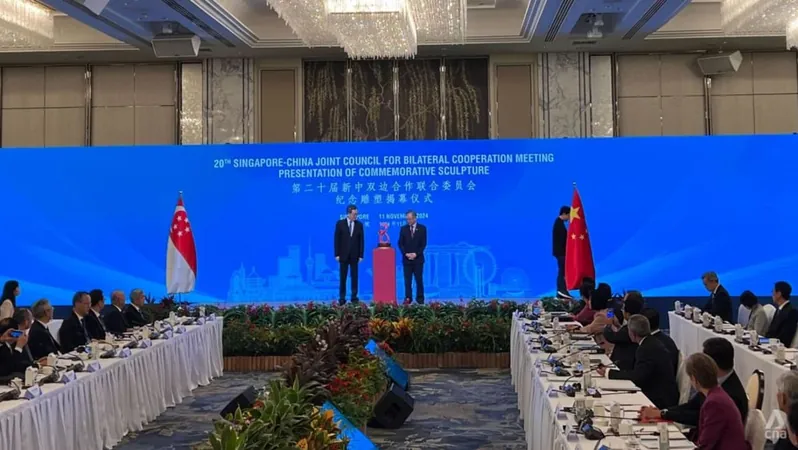
Singapore and China Forge Stronger Bonds with 25 New Agreements Amid Global Challenges
2024-11-11
Author: Ming
Overview
In a historic move, Singapore and China have cemented their partnership with 25 new agreements at the 20th Joint Council for Bilateral Cooperation (JCBC), demonstrating a commitment to enhancing collaboration across trade, finance, and maritime sectors. The event took place at the prestigious Shangri-La Hotel in Singapore on November 11, 2023.
Bilateral Cooperation
Singapore's Deputy Prime Minister, Gan Kim Yong, and visiting Chinese Vice Premier, Ding Xuexiang, co-chaired this crucial meeting - a key forum that takes place annually to assess and steer the trajectory of their relations. Notably, this year’s agreement count surpassed last year's with one additional MOU, reflecting a growing ambition between the two nations.
“The upgrade of our relations last year has clearly injected new energy into our bilateral agenda, making it bolder and more future-oriented,” remarked Gan. In a significant upgrade last year, Singapore and China had redefined their ties to an “All-Round High-Quality Future-Oriented Partnership,” following a meeting between Singapore's former Prime Minister Lee Hsien Loong and Chinese President Xi Jinping.
Vice Premier Ding echoed these sentiments, emphasizing China’s readiness to deepen cooperation in line with the strategic consensus reached by their leaders.
Navigating Complex Geopolitical Waters
Amid shifting global dynamics, particularly with rising tensions between the United States and China, Singapore is focused on maintaining a stable relationship with both powers. “In this challenging environment, we must remain flexible and adaptive in our strategies,” Gan stated. The Singaporean government recognizes the hurdles posed by geopolitical uncertainty, including heightened tariffs and trade threats but remains committed to fostering constructive dialogue between the US and China.
Revitalizing Financial and Trade Cooperation
Significant initiatives discussed included plans to boost financial cooperation, particularly in green finance. This involves the central banks of both countries working together to harmonize green financing criteria and encourage environmentally sustainable investment flows. Central banks will also pilot programs to improve access for international investors to China's burgeoning bond market.
In trade relations, the two countries reaffirmed their dedication to enhancing the China-Singapore Free Trade Agreement (CSFTA), ensuring more favourable conditions for investors in various sectors—including retail, construction, and architecture. The latest enhancements to the CSFTA are set to take effect on December 31, 2024, further solidifying Singapore's role as a crucial trade partner for China.
Expanding Maritime Connections
The maritime sector is set to benefit enormously from the new agreements, as Singapore and China aim to elevate their green and digital shipping corridor initiatives. These collaborations will facilitate decarbonization efforts and the digital transformation of their maritime industries, aligning with global environmental standards.
Celebrating 30 Years of Collaboration: The Suzhou Industrial Park
A highlight of the JCBC meeting was the celebration of the Suzhou Industrial Park, Singapore's first government-to-government project in China. Now marking its 30th anniversary, the park has long been considered a flagship example of successful Sino-Singaporean cooperation. Both countries are finalizing a 10-year blueprint to enhance the park's role in global sustainable development, aiming to tackle critical issues like climate change and an ageing population.
Looking Ahead
As the two nations celebrate their 35th anniversary of diplomatic ties next year, leaders are optimistic about the future of Singapore-China relations. The dynamic partnership, based on mutual respect and shared goals, is poised to not only fortify regional collaboration but also to address global challenges, ensuring a prosperous future for both countries.
In conclusion, these agreements signify a robust commitment to collaboration in an uncertain global landscape and set the stage for sustained growth and innovation. As global leaders monitor these developments closely, the world will be watching how this partnership evolves in the years to come.




 Brasil (PT)
Brasil (PT)
 Canada (EN)
Canada (EN)
 Chile (ES)
Chile (ES)
 España (ES)
España (ES)
 France (FR)
France (FR)
 Hong Kong (EN)
Hong Kong (EN)
 Italia (IT)
Italia (IT)
 日本 (JA)
日本 (JA)
 Magyarország (HU)
Magyarország (HU)
 Norge (NO)
Norge (NO)
 Polska (PL)
Polska (PL)
 Schweiz (DE)
Schweiz (DE)
 Singapore (EN)
Singapore (EN)
 Sverige (SV)
Sverige (SV)
 Suomi (FI)
Suomi (FI)
 Türkiye (TR)
Türkiye (TR)